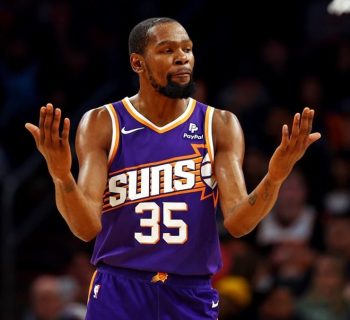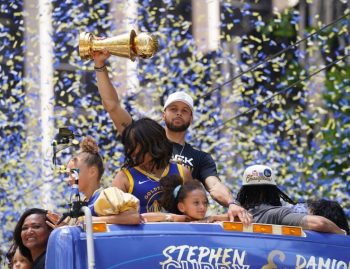NBA
NBA PM: The Miami HEAT Deserves Recognition

If you haven’t already done so, take a moment to recognize and congratulate the Miami HEAT, who gave great effort this season. This sounds like an unremarkable proposition on its face and yet it really is quite an achievement. The HEAT got off to a rough 11-30 start to the season and turned away from a league-wide trend. Fans and critics called for and predicted the team would purposefully lose (or “tank”). Miami did no such thing.
By ignoring that line of thinking, the franchise made a very real sacrifice. Despite having a real incentive to lose, the team stayed dedicated to winning, which weakened the team’s 2017 draft lottery odds. If they had landed a playoff seed, the HEAT could have sent a strong message to the league about not giving up and playing to win.
At their lowest point (11-30), the HEAT were winning 26.8 percent of their games. If the team had simply continued to win at that pace for the rest of the season, they would have ended the season with 22 wins. For perspective, 22 wins constitutes only two more wins than the team with the worst record this season, the Brooklyn Nets, and would have given the HEAT the second-best draft lottery odds.
Take a look at teams like the Phoenix Suns who made a decision as a franchise to not win and further improve their projected draft lottery odds. Their dedication to losing ultimately succeeded when they overtook the Los Angeles Lakers with the second-worst record in the final weeks of the season. How did the Suns get there? By implementing the classic tanking strategy of shutting down capable veterans and key contributors such as athletic point guard Eric Bledsoe, who also happens to be an entertaining player for fans to watch.
Meanwhile, the Los Angeles Lakers appeared to follow the tanking trend and continued to sit seemingly healthy veterans and various talented younger players as the season went on. However, as the season came to an end, the Lakers that did play found ways to be productive. A couple of Lakers players spoke out about tanking, including Lakers forward Julius Randle, who had strong words on the subject.
“Me personally, I know my guys around me, we don’t believe in going out there and trying to lose games,” Randle said. “The basketball gods will come back at you. I believe in that. It’ll come back and haunt you, so you don’t do that. You got to treat the game with respect.”
Many Lakers fans were frustrated, watching their hold on next year’s draft pick (top-three protected) get worse with the team winning five of their final six games. Other fans were excited to once again see great effort, excitement and winning basketball, which are some of the traits normally associated with the Lakers — one of basketball’s most winningest organizations.
For Miami, it’s unfortunate that the team played so well the last few months of the season and yet still came up short. By passing on the opportunity to improve their own draft odds by tanking, the HEAT treated the game of basketball with respect, as Randle mentioned above. They ignored the league’s strong incentive to tank, a strategy that the Philadelphia 76ers have employed so heavily over the years that the phrase “The Process” has become a running joke of sorts.
What makes the HEAT’s failure to make the postseason even more frustrating is that other teams were tanking or resting players, which helped to prevent Miami from making the playoffs. The NBA was poised for a night of high-stakes drama, where making the playoffs would be based on who won and who lost on the final night of the season.
Instead, various teams opted to continue to tank or simply rest healthy players, leaving fans with a slate of games with essentially predetermined outcomes based on teams opting to not fully compete. The Brooklyn Nets, who rested six players from their final game against the Chicago Bulls, may be the most culpable of the bunch (they won’t retain their 2017 draft pick and thus have less of a motive to tank). By offering virtually no resistance, the Bulls were able to win a relatively easy victory and be assured the final playoff spot in the Eastern Conference Playoffs.
As mentioned above, the HEAT began the season quite poorly, and in that sense, have only themselves to blame for ending the season in this situation. Once the HEAT recovered from their early season struggles, they were a highly successful team. Beginning in January, they won 64.5 percent of their remaining games, a fairly remarkable rate of success given the circumstances.
Coming into this season, head coach Erik Spoelstra had his work cut out for him. Most of the offseason centered around speculation as to whether All-Star forward Chris Bosh would return from his unfortunate blood clotting issues. Bosh did his best to lobby the HEAT to allow for his return but he was ultimately forced to yield and sit the season out due to his serious health concerns. Moving forward without Bosh forced the team to rely on a variety of role players; a stark contrast for a franchise not far from removed from winning two championships and appearing in four straight NBA Finals.
To seemingly have a chance to win at a high level, center Hassan Whiteside would need to take a leap as a cornerstone player not just on defense but especially on offense. In addition, point guard Goran Dragic would need to thrive as the team’s primary ball-handler after sharing duties with the departure of three-time-champion guard Dwyane Wade. Also, second-year forward Justise Winslow (10th pick in the 2015 draft) would hopefully step up for the HEAT to remain competitive. Going into this season, the team had to hope for the development of these younger players and the success of their recent acquisitions.
Winslow failed to deliver after suffering a season-ending shoulder surgery, which put an end to a rocky season. However, Whiteside, Dragic and a host of less heralded players stepped up. Guard Dion Waiters, an offseason acquisition, had a turnaround season compared to his previous tenure with the Oklahoma City Thunder and helped to nearly lead the team to the playoffs. In fact, the ankle sprain he suffered on March 17, most likely played a strong part in the HEAT’s ultimate failure to make the playoffs as the season wound down.
With a playoff berth off the table, what positives can be taken away from this season? Many analysts, fans and HEAT players applauded the phenomenal coaching job by Spoelstra and the collective effort of the team.
“This is probably, in my opinion, the best coaching job that [Coach Spoelstra] has done,” Udonis Haslem stated.
Looking forward, based on the projected cap space for the 2017-18 season, the HEAT will have up to $43.5 million in cap space, assuming that Bosh’s salary is cleared. With that much available cap space, the HEAT may be able to supplement the roster with significant additional talent. Prospective free agents might find the idea of playing for such a well-respected coach who maximizes the talents of those who play for him enticing (in addition to living in Miami and not having to pay any state income taxes).
Under Spoelstra’s direction, many players experienced a big jump in productivity, like forward James Johnson, guard Wayne Ellington and guard Tyler Johnson. In addition, undrafted rookie guard Rodney McGruder also served as a key contributor in his first season.
Johnson in particular was excellent this season. Johnson lost a significant amount of weight prior to the season and was given a much bigger role this season than he has had in the past, which he thrived in. Johnson can thank the HEAT (and himself) if he is able to land a substantial contract this upcoming offseason.
****
As alluded to, there are clear incentives to lose in certain situations to improve a team’s odds of getting a top draft pick in the lottery. Franchise quality players are few and far between and the ability to increase the odds of acquiring any of these players is hard for a franchise to resist. The above is meant to pay tribute to a team that bucked that trend, and perhaps logic, and prioritized culture, competition, entertaining its fans and respecting the game of basketball. The decision to compete may not help Miami on draft night, but there is value in not giving up and competing even when everyone else tells you to.













